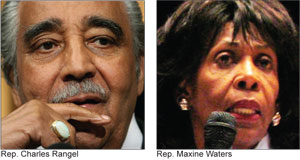–

WASHINGTON (FinalCall.com) – While there is no rescinding what many observers consider to be a punishment that was far too severe for the crime–the public censure of Rep. Charles Rangel (D-N.Y.) by the House of Representatives on Dec. 2–another Congressional Black Caucus member has exposed a cloud which could taint much of the work of the committee that recommended the unprecedented punishment, House Committee on Standards of Official Conduct, the Ethics Committee.
“From the beginning, I have been concerned with the Committee’s unsupported conclusions, often contradictory arguments and unfounded negative inferences,” Rep. Maxine Waters said in a statement concerning charges against her which were unexpectedly postponed indefinitely on the day her trial was scheduled to begin.
“It now seems that these concerns were justified, as the Committee’s sanctioning of its own attorneys is an acknowledgement of flaws and failures in the Committee’s process and handling of my case.” On that same date–Nov. 29–the committee chair suspended, without explanation, two senior lawyers who had been investigating the Waters case.
Mrs. Waters, a ranking member of the House Financial Services Committee, was investigated over the summer because of allegations she provided assistance to OneUnited Bank, a Massachusetts-based Black-owned bank, because the bank received $12 million in federal bailout funds in 2008.
Mrs. Waters is charged with failing to disclose to federal bank regulators that her husband owned stock in the bank and had served on its executive board. She insists that her intervention was in behalf of all minority-owned banks, not just for OneUnited.
“The allegations against Maxine Waters, I find, in terms of what I’ve read, I find pretty far fetched,” Dr. David Bositis, a senior research fellow at the Joint Center for Political and Economic Studies told The Final Call.
“I’ve never actually thought of the Ethics Committee as having anything to do with ethics, if you really want to know,” Dr. Bositis continued. “I’ve always thought of it, to some degree, as the House as an institution, sort of covering its ass. That’s really what it’s about.
“Basically I think that the Ethics Committee is about trying to maintain the reputation of the House, which is pretty much a helpless cause. The public has a general feeling, they hold the House in such low regard that it’s pretty pointless talking about House ethics,” Dr. Bositis said.
For his part, Mr. Rangel and his supporters insist that he–like Mrs. Waters–received no financial gain whatsoever from his questionable behavior. Mr. Rangel himself invited the investigation two years ago, and has since admitted that he failed to submit accurate financial disclosure statements.
Mr. Rangel was not charged with, let alone convicted of a crime, he insists; there was no fraud involved in any of his behavior; and he voluntarily hired a forensic accountant to scrub his financial records clean, and paid all back taxes he owed.
In some of the most recent of the 22 previous times the House censured one of its members, the charges were far more flagrant than those brought against Mr. Rangel. In 1983 two members–Reps. Gerry Studds of Massachusetts and Daniel Crane of Illinois–were found guilty of sexual misconduct with teenaged House Pages, whom they supervised. In 1980 Rep. Charles Wilson of California was found to have received improper gifts, and used so-called “ghost employees” and improperly used campaign funds to enrich himself. In 1979, Michigan Rep. Charles Diggs was censured after he was convicted in court of payroll fraud.
Other censured members were found to have accepted bribes, and to have sold appointments to U.S. military academies.
“Eight of the 11 counts that the committee found that Congressman Rangel has violated are for raising money for a center at a public university in his congressional district,” Rep. Bobby Scott (D-Va.) a member of the subcommittee which investigated Mr. Rangel said in his defense during the debate by the full House.
Several members of the Congressional Black Caucus agreed with Mr. Scott that the punishment of censure of Mr. Rangel was excessive. Most were among the 79 members–including three Republicans–who voted against the motion to censure. More than 140 members voted for an amendment which would have given Mr. Rangel a milder reprimand rather than censure.
“Well,” Mr. Scott argued in Mr. Rangel’s defense, “we have the case of former Speaker Newt Gingrich who was found to have violated House rules by misusing tax-exempt entities to fund a partisan college course aimed at recruiting new members to the Republican Party after he had been warned not to.
“Moreover, he was found to have filed four false reports to the committee about the matter in 13 instances, causing substantial delays and expense to the committee. Yet he was reprimanded, not censured, and did not lose his job as Speaker. Congressman Rangel did not lie about his activities, he gained no partisan advantage, he believed that he was doing right although he made mistakes, and he received no prior warning, as did Speaker Gingrich,” said Mr. Scott.
“Yet Congressman Rangel lost his chairmanship on Ways and Means and now faces the possibility of a censure, not a reprimand, as Speaker Gingrich received.”
In her case, two days after she called for House Speaker Nancy Pelosi (D-Calif.) to launch an investigation into the Ethics Committee, Rep. Waters cancelled her request.
“Upon the advice of my colleagues whom I trust and admire, I am not pushing for a vote on this resolution today,” Mrs. Waters said in a statement Dec. 2. “In doing so, however, I am requesting that the committee set the record straight, on its own accord in a bipartisan manner.”
Rep. Waters insisted that the postponement of her trial violated her “due process rights and the rules of the committee,” and said she believes that the Ethics Committee’s handling of the situation subjected the committee itself, and not those it had accused, to “public ridicule.”












